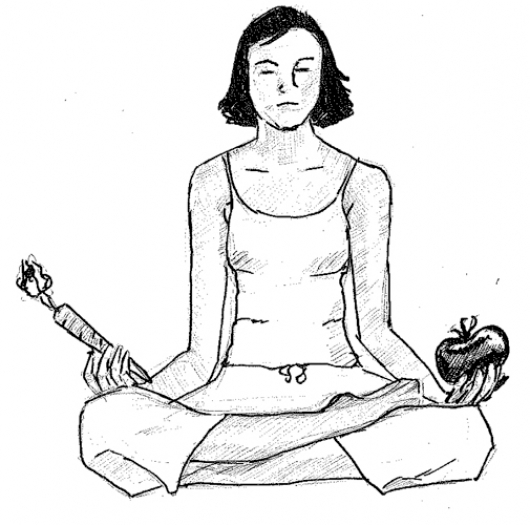Food for Meditation in Ohio
By Chelsea Pula | May 15, 2010

The student club “Bhakti” is fast becoming the best source of free vegetarian food on the campus of Columbia University in New York. As Ajay Mangal, remarked, “If you’re allergic to delicious, this [Bhakti] isn’t the place for you.” However, Bhakti is about more than food—it is also one of Columbia’s strongest spiritual communities.
Two beloved Hare Krishna monks run the club: Dave, who never fails to throw in a joke, and Pandit, a true sage and father figure. Although some students might be initially worried about the strange orange outfits these monks don, their open-minded approach to all backgrounds, all belief systems, and all faiths quickly breaks down these barriers. Bhakti reaches in seconds what it sometimes takes years to achieve in diversity training: a safe environment that is free of judgment, allowing students to be themselves, without stress. It’s kind of refreshing after spending time on the campus of, reportedly, the country’s second-most-stressful university, in the midst of the world’s busiest city.
Students put up walls—through habits, silence, or attitude—when stressed. After Bhakti removes the cause, a flood of pent up emotions, feelings, and ideas rush out that most of us don’t even realize are there. Bhakti gets students talking about hushed issues like mortality, anger, or fear, without generating the heat of debate or pushing a religion.
Bhakti’s voice in the exchange of ideas is meaningful. In addition to offering a safe environment, Dave and Pandit offer a perspective relatively unknown to the typical westernized student. The level of difference in worldview is epitomized by Krishna, the supreme deity of this sect of Hinduism. He is not portrayed as a martyr suffering for human sins, nor is he spiteful or angry; rather, Krishna is always smiling and often portrayed dancing and playing a flute. This contrast effectively opens the minds of students and offers an alternative way of looking at life, which is invaluable, regardless of one’s personal belief system. Students are trying out more than just new food—they’re trying out a new mindset.
Minds are not just opened by Bhakti—they’re also strengthened through meditation. Every Thursday morning, students are invited to a 7 a.m. meditation session, followed by breakfast. The monks recommend that everyone meditate every day and warn against the dangers of an untrained and unfocused mind. Practicing daily meditation reduces stress and chance of illness, while improving sleeping habits and the ability to concentrate. Meditation instruction is the most useful service offered by Bhakti because it is almost never taught in the western tradition.
Yoga is another strong program offered by Bhakti. Although yoga is now one of the more popular forms of exercise in the States, the form most commonly practiced is westernized and has lost touch with many of the tradition’s original values. As Pandit explains, yoga is not just exercise—it literally means “union with the divine.” Though yoga classes are common in New York City and even on campus, few maintain the spiritual approach that is so essential to proper practice of the exercises.
I suppose I might have been intimidated myself if I’d known beforehand about all of Bhakti’s spiritual activities. All I knew—like most of us, I suppose—was that there was a vegetarian cooking class on Tuesday nights. Upon discovering just how delicious this food was, I started coming every week.
But even those who only attend meetings for the free food inadvertently reap the benefits of Bhakti. “One way we express love for others is by cooking for one another. At every Bhakti meal, we show love to each other through cooking, but also to Krishna by offering food to the divine,” says Pandit. Eating is essential to life, and when practiced with a vegetarian’s reverence for life and a respect for a higher power, strengthens the community and the connection with the divine and is thus another form of yoga. Perhaps it is these qualities that make the food prepared during Bhakti especially delicious and warming.
Bhakti is a celebration of life and peace. It’s a chance to slow down, eat, and ponder life’s mysteries—something that we tend to cut out of our schedules as we become increasingly ambitious. As the programs continue to flourish, one thing is becoming clear: students come for nourishment of the body and stay for nourishment of the soul.















